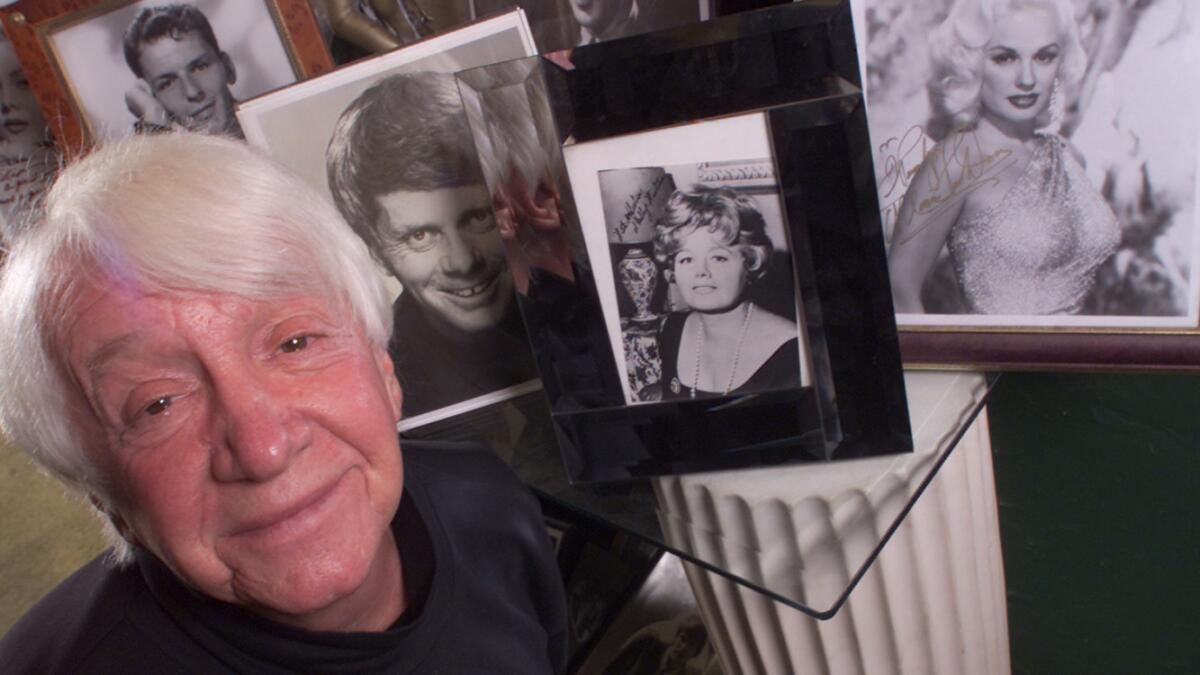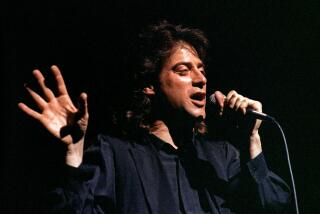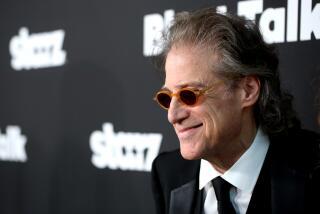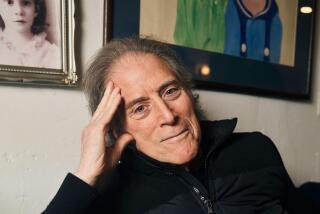Skip E. Lowe dies at 85; talk show host inspired Jiminy Glick

Skip E. Lowe, who hosted a weekly celebrity talk show in Los Angeles for more than 35 years, persuaded several well-known personalities to appear on the TV program, usually in the twilight of their careers.
But the ever-ebullient, sometimes befuddled Lowe — who was the inspiration for the Martin Short comic character Jiminy Glick — was never paid for doing the interview show. It was on public access cable TV and available to a limited audience.
Still, Lowe, who long struggled to find his niche in show business, did the bare-bones program week after week. “He was on television,” his friend and publicist Alan Eichler said, “and he never gave up thinking something big was going to happen.”
Lowe, 85, died Monday at an assisted living facility in Hollywood. He had been suffering from emphysema and other respiratory problems, Eichler said.
The last episode of “Skip E. Lowe Looks at Hollywood” was taped about two weeks ago. The program appears locally on Time Warner Cable, as well as on cable systems in New York and San Francisco.
Famous guests on the show, which debuted in 1978, included Orson Welles, Bette Davis, Eartha Kitt, Tony Curtis and Milton Berle. They would generally reminisce about their careers, with Lowe often interrupting to interject comments.
Sometimes he’d get so enthused he’d make infamous goofs, such as when he asked a guest, “Marilyn Monroe went back with Joe DiMaggio after she committed suicide, didn’t she?”
And there were somewhat askew comments, as in his assessment of Shelley Winters in a 2001 Los Angeles Times interview, “This is a very strong lady who’s filled with compassion for everyone in the world. Comparable, really, to Eleanor Roosevelt — only Shelley can act.”
When Lowe couldn’t get an A-lister for the show, which was the vast majority of the time, he would sometimes settle for a relative, such as Dodd Darin (son of Bobby) or Jacqueline Stallone (mother of Sylvester).
Otherwise, guests might include actors with small parts on TV or in stage shows. “He would book people that couldn’t get on Letterman or Leno,” Eichler said. “It gave them exposure.”
Lowe felt he influenced interviewers who actually got paid. “Charlie Rose is my favorite, but, honey, you have to understand, I was doing it way before him,” he said in the Times interview. “Of course, he’s much more intelligent than I am, and he does his homework more than I do.”
The lack of homework was evident in his interview with actress Kate McGregor-Stewart, who had a recurring role in the current ABC network series “Scandal.” Lowe opened the interview, “Tell me about that show, I’ve never seen it.”
It was all fodder for Short, who performed the unctuous Jiminy Glick in a fat suit on Comedy Central and other venues. He interviewed current celebrities — the kind Lowe could not get for his show — complete with interruptions and a dearth of information. “You’re a stand-up comedian, I was told,” Glick said to Ellen DeGeneres.
Lowe was not a fan of Glick at first. “He thought he was being ridiculed,” Eichler said, “but he ended up thinking it was funny.”
Lowe was born Sammy Labella on June 5, 1929, in Greenville, Miss., and grew up in Rockford, Ill. It was a difficult childhood for an effeminate boy who liked to dress up in costumes and entertain. After he was severely beaten by four neighborhood bullies at 9, his mother took him to Hollywood, where she hoped to get him into the movies.
He won a scattering of small, mostly uncredited roles and eventually developed a song and dance routine he performed in clubs in New York. Honing his career as a master of ceremonies, he announced acts in legitimate clubs and strip joints. Later in Los Angeles, his steady paying job was to host talent showcases, most recently at Sprazzo restaurant in Westwood.
Though he never hit it big, he reveled in the bit of fame his cable access show brought him. “When I walk up Sunset Boulevard,” he told The Times, “people are honking horns and screaming, ‘Skip E., We love you!’ ”
He had no immediate survivors.
david.colker@latimes.com
Twitter: @davidcolker
More to Read
Start your day right
Sign up for Essential California for the L.A. Times biggest news, features and recommendations in your inbox six days a week.
You may occasionally receive promotional content from the Los Angeles Times.







